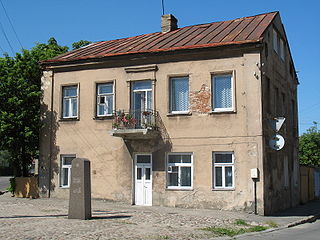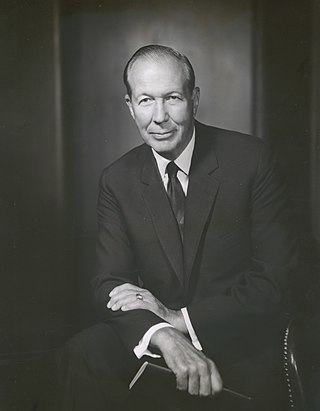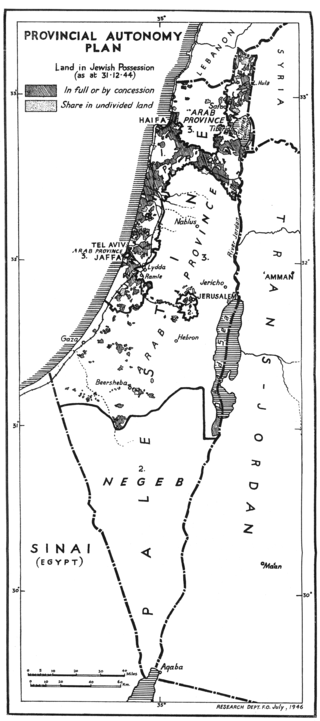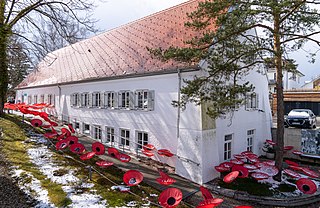
Heinrich Luitpold Himmler was the Reichsführer of the Schutzstaffel, a leading member of the Nazi Party of Germany, and one of the most powerful men in Nazi Germany, primarily known for being a main architect of the Holocaust.

The United States Secretary of Homeland Security is the head of the United States Department of Homeland Security, the federal department tasked with ensuring public safety in the United States. The secretary is a member of the Cabinet of the United States. The position was created by the Homeland Security Act following the attacks of September 11, 2001.

Robert Ferdinand Wagner I was an American politician. He was a Democratic U.S. Senator from New York from 1927 to 1949.

The Museum of Jewish Heritage, located in Battery Park City in Manhattan, New York City, is a living memorial to those murdered in the Holocaust. The museum has received more than 2 million visitors since opening in 1997. The mission statement of the museum is "to educate people of all ages and backgrounds about the broad tapestry of Jewish life in the 20th and 21st centuries — before, during, and after the Holocaust."
The Robert F. Wagner Graduate School of Public Service is the public policy school of New York University in New York City, New York. The school is named after New York City former mayor Robert F. Wagner Jr. in 1989.

Displaced persons camps in post–World War II Europe were established in Germany, Austria, and Italy, primarily for refugees from Eastern Europe and for the former inmates of the Nazi German concentration camps. A "displaced persons camp" is a temporary facility for displaced persons, whether refugees or internally displaced persons. Two years after the end of World War II in Europe, some 850,000 people lived in displaced persons camps across Europe, among them Armenians, Czechoslovaks, Estonians, Greeks, Poles, Latvians, Lithuanians, Yugoslavs, Jews, Russians, Ukrainians, Hungarians, and Belarusians.


Bergen-Belsen displaced persons camp was a displaced persons (DP) camp for refugees after World War II, in Lower Saxony in northwestern Germany, southwest of the town of Bergen near Celle. It was in operation from the summer of 1945 until September 1950. For a time, Belsen DP camp was the largest Jewish DP camp in Germany and the only one in the British occupation zone with an exclusively Jewish population. The camp was under British authority and overseen by the United Nations Relief and Rehabilitation Administration (UNRRA) with camp directors that included Simon Bloomberg. Today, the camp is a Bundeswehr barracks, having been a British Army base until 2015.
Sh'erit ha-Pletah is a Hebrew term for Jewish Holocaust survivors living in Displaced Persons (DP) camps, and the organisations they created to act on their behalf with the Allied authorities. These were active between 27 May 1945 and 1950–51, when the last DP camps closed.

The Kovno Ghetto was a ghetto established by Nazi Germany to hold the Lithuanian Jews of Kaunas (Kovno) during the Holocaust. At its peak, the ghetto held 29,000 people, most of whom were later sent to concentration and extermination camps, or were shot at the Ninth Fort. About 500 Jews escaped from work details and directly from the ghetto, and joined Jewish and Soviet partisan forces in the distant forests of southeast Lithuania and Belarus.
Lazarus Joseph was an American lawyer and politician from New York City. A member of the Democratic Party, he was a New York State Senator from 1934 to 1945, and was the New York City Comptroller from 1946 to 1954.
The La Guardia and Wagner Archives was established in 1982 at LaGuardia Community College in Long Island City, Queens, New York, to collect, preserve, and make available primary materials documenting the social and political history of New York City, with an emphasis on the mayoralty and the borough of Queens. The purpose of its founding went beyond serving as a repository, but to establish the college as a location for scholarly research. The archives serves a broad array of researchers, journalists, students, scholars, exhibit planners, and policy makers. Its web site provides guidelines to the collections, as well as over 55,000 digitized photographs and close to 2,000,000 digitized documents.

William Chapman Foster was an American businessman and high-ranking government official. He served as United States Under Secretary of Commerce and United States Deputy Secretary of Defense under President Harry Truman. Later, he served as the first United States Arms Control and Disarmament Agency director, under Presidents John F. Kennedy and Lyndon B. Johnson.

The Morrison–Grady Plan, also known as the Morrison Plan or the Provincial Autonomy Plan was a joint Anglo-American plan announced on 31 July 1946 for the creation of a unitary federal trusteeship in Mandatory Palestine.
Jacob Gens was the head of the Vilnius Ghetto government. Originally from a merchant family, he joined the Lithuanian Army shortly after the independence of Lithuania, rising to the rank of captain while also securing a college degree in law and economics. He married a non-Jew and worked at several jobs, including as a teacher, accountant, and administrator.
Geoffrey P. Megargee was an American historian and author who specialized in World War II military history and the history of the Holocaust. He served as the project director and editor-in-chief for the Encyclopedia of Camps and Ghettos, 1933–1945 produced by the United States Holocaust Memorial Museum. Megargee's work on the German High Command won the 2001 Distinguished Book Award from the Society for Military History.

Donald Harrison Elliott was an American urban planner. He was chairman of the New York City Planning Commission from the late 1960s to the early 1970s. He helped lead the city away from the large-scale disruptive projects of Robert Moses to more neighborhood-friendly and historically respectful development.

The Erinnerungsort Badehaus is a historical museum situated at Kolpingplatz in Waldram, a district of the town of Wolfratshausen, approx. 30 km south of Munich (Germany). Documents of the settlement's history since its foundation in 1939 are exhibited in the museum. It is an extracurricular place of learning and a place of encounters for various generations, nations and religions. The association Bürger fürs Badehaus Waldram-Föhrenwald e.V. is owner and operator of the museum. It saved the building from demolition, had it refurbished and developed the concept for it to be turned into a museum. All the activities of people are and have been on an honorary basis. In 2022 the museum received the Obermayer-Award for its outstanding engagement in saving the Jewish history and for its ongoing fight against current prejudices.











